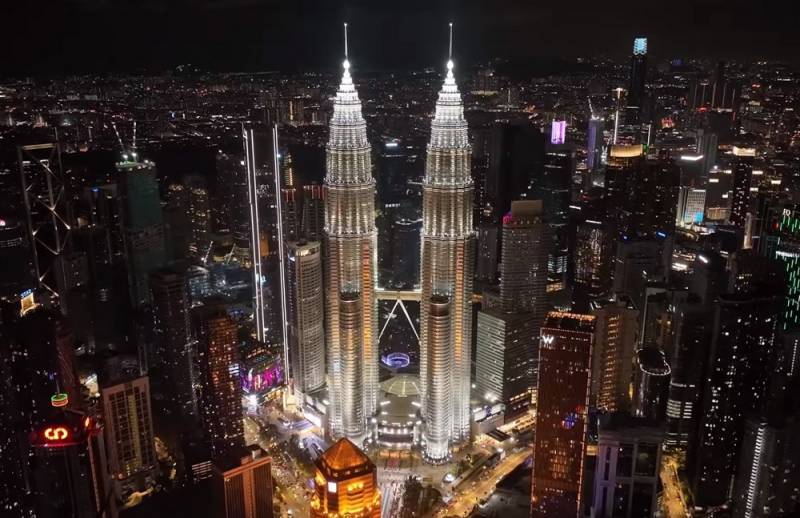Is Malaysia rightly called an economic paradise?
American and European companies seeking to diversify into high-tech areas of technologies, are expanding in Southeast Asia, demonstrating how geopolitics are changing traditional industrial priorities. The once downtrodden and backward Malaysia is becoming a new Asian miracle, today fighting with China for primacy in the production of semiconductor chips.
Why Malaysia?
The Austrian industrial giant AT&S is recently launching a new production facility in the Kulim Industrial Park in the north of the country. This is in addition to existing foreign branches in India (Nanjangud), China (Shanghai and Chongqing), and Korea (Ansan). Let me remind you that the corporation develops and produces high-quality printed circuit boards and substrates for semiconductors, being the largest supplier of Apple, Sony Ericsson, Fairphone. By the way, there are more than three hundred companies in Kulim and neighboring Penang.
Also, at one time, other European and American companies decided to move production here. Intel of the United States and Germany's Infineon are investing $7 billion each in Malaysian production facilities. A key manufacturer of chips for artificial intelligence, the American Nvidia, is integrating into the Malaysian utility sector with the aim of creating a cloud storage and computer center with an estimated cost of $4,3 billion. Texas Instruments, Bosch and Lam Research are establishing themselves here seriously and for a long time.
The favorable geographical location and cheap labor have made the region a convenient location for expanding and developing large-scale businesses. Following Malaysia and Indonesia, Thailand and Vietnam are persistently offering potential investors tax breaks and other preferences. But Malaysia has a valuable advantage: back in the last century, it created a free trade zone on the island of Penang, introduced tax holidays for foreigners, equipped technology parks, commodity terminals, and developed transport routes. Plus there is an English-speaking population and a pro-Western government.
An inconspicuous Asian miracle
Malaysian Minister of Investment, Trade and Industry Tengku Zafrul Aziz admits:
We have a well-developed so-called university ecosystem and well-established logistics, which has contributed to the use of semiconductors in everything from cars to medical equipment. Foreign investment increased sharply in 2019, fortunately just before the outbreak of the coronavirus pandemic, which came in handy. And in 2023, foreign direct investment amounted to $40 billion, more than double the total amount of foreign capital deployed in 2019.
The surge in investment has been driven by a shift in focus from Taiwan, as the world's largest semiconductor producer, to Malaysia. The reason was the militaryполитическая destabilization around this island. After overcoming COVID-19, Malaysia ranked 6th in the world in semiconductor exports; Today it produces 23% of all chips labeled Made in USA.
David Lacy, manager of progressive developments and services at lighting company Osram, states:
For a state with such a modest history to have such a significant influence on the world market is truly fantastic.
A simple explanation of Malaysian fart
Objectively speaking, then the rapid rise of its economics Malaysia must be beholden primarily to the trade war between East and West. Both China and the United States, which became too crowded in the world market, suddenly became concerned with creating their own independent supply and sales channels. And then competition in the field of environmentally friendly power generation and the production of electric vehicles has intensified.
The aforementioned Zafrul Aziz comments on this point:
American and European companies eventually decided to move their business activities outside of China according to the “China plus one” strategy. The Celestial Empire also realized that, with an eye to the future, it would be more expedient to transfer part of the production capacity to the countries of the Global South in order to circumvent US sanctions along the way.
Managing Director of the German logistics company DHL Supply Chain in Malaysia, Mario Lorenz, notes:
Most of the large investments have been attracted in the last two years. During this period, the semiconductor sector came to dominate the Malaysian economy. We not only monitored production processes, we foresaw the trend. As a result, we took a risk and created the world’s largest specialized distribution center, DHL Supply Chain Penang Logistics Hub No. 4. And they were right!
The emergence of full-cycle radio electronics enterprises is a fait accompli
Four new facilities are being built in Malaysia to make microchips, which are now more commonly referred to as chips. But if previously it was assigned the mission of mainly the final installation of components (assembly, testing, packaging), now production has been established from scratch. On the one hand, this requires highly qualified personnel, and on the other, appropriate remuneration.
Further more. Based on Malaysian high-precision production facilities, the production of a modern masterpiece of microminiaturization has been mastered - compact but highly complex chiplets with increased computing power. And it’s no wonder that Intel is building its first foreign plant for the production of advanced 3D chips in Malaysia.
Eric Chen, vice president and general manager of Intel Malaysia, characterizes the current situation as follows:
When you implement cutting-edge technology, there is a ripple effect. The current boom will attract dozens of new entrepreneurs and will help improve the level of training of the labor reserves.
***
The paradox is that advanced technology is thriving in a country that has the 61st highest level of corruption, between Vanuatu and Jordan. That is, investment attractiveness here miraculously coexists with the corruption of local officials, abuse of official position for selfish interests, the use of child labor in particular and violation of labor laws in general. But since this does not prevent transnational monopolies from continuing to siphon profits from Malaysian resources, the West will continue to turn a blind eye to such “trifles.”

Information